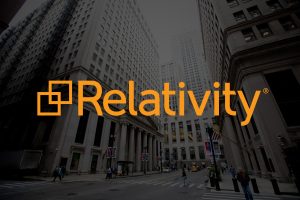 From time to time, I will include a parentheses enclosed disclosure about a relationship I might have with companies that I write about here on Above the Law or elsewhere, including whether they are currently running sponsored ReplyAll campaigns or simply flying me out to speak at a conference. With eDiscovery software platform Relativity, I feel the need to do a little more than make the normal disclosures. As much as I try to cover legal disruption objectively, it would be disingenuous to claim that I’m unbiased when it comes to Relativity.
From time to time, I will include a parentheses enclosed disclosure about a relationship I might have with companies that I write about here on Above the Law or elsewhere, including whether they are currently running sponsored ReplyAll campaigns or simply flying me out to speak at a conference. With eDiscovery software platform Relativity, I feel the need to do a little more than make the normal disclosures. As much as I try to cover legal disruption objectively, it would be disingenuous to claim that I’m unbiased when it comes to Relativity.
Relativity was one of the first big legal tech companies to run a ReplyAll campaign here on ATL and over at Bloomberg’s Biglaw Business. Many companies get burned working with early stage startups, so I continue to remain grateful to Relativity and founder Andrew Sieja for taking a chance on us early. But, I’m not only telling you this because of disclosure. There is a distinct pattern of behavior at Relativity to support innovation at all phases, and it was one of the stories last week coming out of Relativity Fest, the annual user conference Relativity hosts in Chicago each Fall.
Here’s a little more background.

Why Law Firms Are Moving Beyond The Billable Hour
Explore 5 expert-backed reasons law firms are rethinking the billable hour and how legal billing software is leading the way.
This year, Relativity invited me to the conference as a judge on their innovation panel. Relativity’s customers, whether it’s law firms like Bricker & Eckler or service providers like H5 or QDiscovery (all three winners at this year’s Fest) will often develop customizable solutions on top of Relativity, and the company showcases these applications and hands out awards. On the law firm side, every litigation is different but, especially in Biglaw, they can be long and sophisticated. Often the sophistication gets to the point where law firms cannot handle the sheer amount of work in a matter without the help of technology.
Bricker’s solution which knocked my socks off (literally, the demo left me barefoot) fits this description to a tee. Here’s the use case (and this is going to sound like a essay question on the bar): Bricker represents a company with eminent domain power to build a pipeline roughly 200 miles long. The client has been granted easements to install the pipeline, but not every house along this 200-mile stretch is consenting to the easement. Bricker realized they had to aggregate the data for all affected tracts of land, track the status of every potential dispute, and sometimes sue land owners. Anyone of these tasks on their own would have stretched a firm thin, but taken together it was a question of whether or not one law firm could handle the matter. Using Relativity, Bricker’s tech team streamlined the entirety of the work including a button that, with one click, would automate all the documents necessary to file a lawsuit. What the solution highlighted for me is that law firms are in the unique position where they can identify pain points and then use their (often substantial) resources to build solutions that make them more efficient. This application is already paying dividends for Bricker. Others in the know who I spoke to at the conference told me that Bricker is winning business left and right because they’ve become technology-enabled specialists. You’d have to have a really good reason NOT to use them for a similar project.
Very often we think of innovation as startups. And, as I will get to in a moment, there were some cool startups — Heretik and Esquify — in which Relativity has now made investments. But, there’s interesting innovation happening inside many of the alternative legal service providers (I include eDiscovery vendors in this category) like H5, which won the 2017 Solution Provider of the Year (I should know, I opened the envelope), or QDiscovery, which won the Community Choice Award. I encourage you to read up on both solutions, as they were super cool and both links have a fun product video if you’re all texted out by the time you finish reading this post. But at the moment, I’m interested in the model as much as I am the specific products. The model of vendors innovating is STRONG because, like the law firm model, it requires the service providers to identify their own pain points and then build technology to solve and distinguish their offering. In fact, many of the great startups were built based on pain point that the founder personally experienced, which is why I’m on the record as bullish on the tech-enabled service provider model.
But, as I have repeated several times, legal tech startups are now officially building on the Relativity platform and Relativity has now made public that they have invested alongside Chicago-based venture capital firms in two of those startups: Heretik (machine learning powered contract review) and Esquify (technology to make your doc review teams more efficient). I met Esquify at last year’s Fest, so it was cool to see all the progress they made, and Heretik also received an investment from an Amlaw 100 firm. I will have each of the founders on ATL for more in-depth interviews, but there are some immediate takeaways worth highlighting, even if you have only a basic understanding of what these companies do.

Free Attorney Time Tracking Template For Smarter Billing
Tired of messy time logs? This free attorney time tracking template helps you bill with confidence and accuracy. Learn more in the full article.
- Companies are building their entire platforms on top of Relativity, even if they are not classically eDiscovery. Heretik is trying to use Relativity to power contract review and compete with the Kira Systems and eBrevias of the world. The team at Heretik actually makes me look pretty smart because earlier this year I wondered aloud (no, it wasn’t a hard prediction) whether eDiscovery and contract review would ever cross paths. The obvious benefit is that, with rare exception, most Biglaw firms have Relativity subscriptions, so Heretik won’t be selling a new system that everyone has to learn from scratch. No organization — law firms included — wants to learn something new, they only do it if they are forced. Time will tell if that is an advantage, but Heretik has some impressive initial traction. I had a chance to sit with Andrew Sieja at the conference (sitting is kind of a misnomer, Andrew doesn’t do a whole lot of sitting), and when I asked him if entrepreneurs could build billion-dollar companies on top of Relativity, he said, “It all depends on how big we get.” He pointed to Salesforce as an example, and while Salesforce is much bigger than Relativity, Apttus has built a company valued in the billions that, to a large extent, was built on top of Salesforce.
- Andrew wants Relativity to be a Google-styled incubator of innovation. It’s telling that Sieja likes to note that Google rewrites Gmail every five years — he seems to want Relativity thinking like a Google (or is it Alphabet?). Now, for the time being, Relativity is only investing in software built on top of Relativity, so if you’re building a business that’s platform agnostic, they’re probably not the right target. They also seem to like Chicago-based companies. But Relativity is a real value add for companies who want to market to legal departments and law firms because, well, there simply aren’t that many billion-dollar companies who have built and sold software to lawyers.
And this is where my initial disclosure is significant. Color me cynical when it comes to older established companies setting up accelerators or trying to cram down innovation. Law firms will do this, but its usually just an attempt at some free PR for appearing innovative. But, I can say from personal experience that Relativity is making a real investment in innovation. Although they are a ReplyAll sponsor, no one at Relativity has ever told me what to write or who to invite to conversations — no one from Relativity has ever participated in the conversations they sponsor! Relativity sponsors ReplyAll conversations because they want more lawyers learning about disruptive trends and startups.
By the way, if you’d like to follow upcoming ReplyAll conversations, simply drop your name and email in below and you’ll get an update the next time one of our legal conversations kicks off here on ATL.
Zach Abramowitz is a former Biglaw associate and currently CEO and co-founder of ReplyAll. You can follow Zach on Twitter (@zachabramowitz) or reach him by email at [email protected].